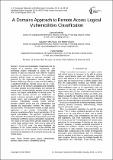A Domains Approach to Remote Access Logical Vulnerabilities Classification

View/
Publication Date
2019Author
S. Ndichu, S. McOyowo, H Okoyo, C. Wekesa
Metadata
Show full item recordAbstract/
Remote access facilitates collaboration and the
creation of a seamless work environment. This
technology enables employees to access the latest
versions of data and resources from different locations
other than the organization’s premises. These additional
locations include home or untrusted networks not
governed by the organization's security policy and
baseline. Balancing between security and accessibility is
a significant challenge. Remote access can be a highsecurity risk if not correctly safeguarded and monitored.
This paper presents some technologies and methods for
remote access. It then highlights security concerns, attack
vectors, and logical vulnerabilities in remote access. To
address these security concerns and weaknesses, we
present a domains approach to logical vulnerabilities in
remote access and vulnerability scoring using the
Common Vulnerability Scoring System (CVSS).
Domains simplify device and user authentication and
separate the organization network into logical and
discrete entities. The separation enables a unique security
application to each domain. Vulnerability scoring
enhances remediation efforts through prioritization of the
logical vulnerabilities. The approach comprehensively
covers all points of compromise during remote access and
contributes to effective logical vulnerability management.
The results of the experiments provide evidence that all
remote access domains have a high severity rating of at
least a 7.28 CVSS score. Our study highlights the
drawbacks of the current remote access methods and
technologies such as the Virtual Private Network (VPN)
and shows the importance of securing all domains during
remote access.
